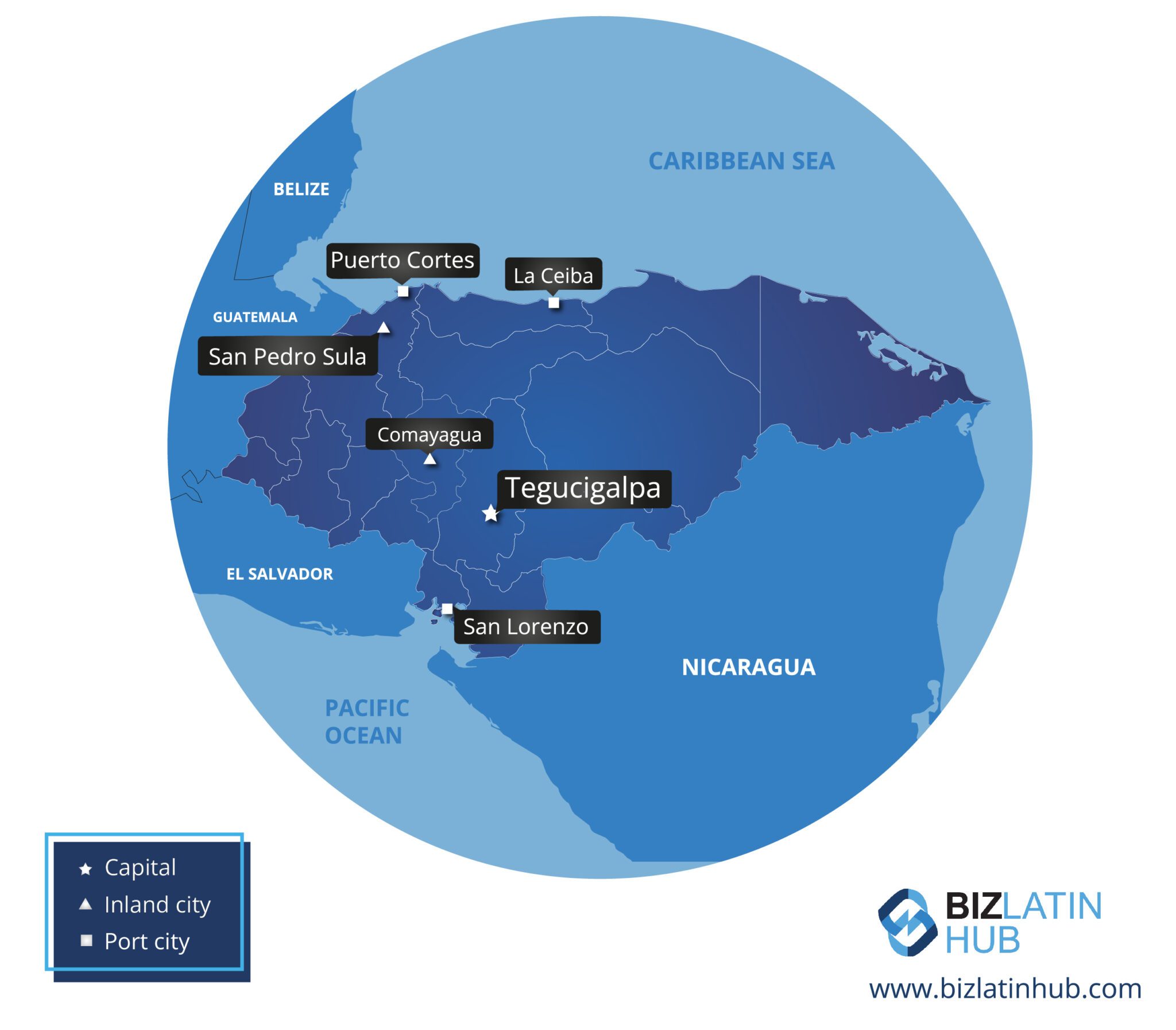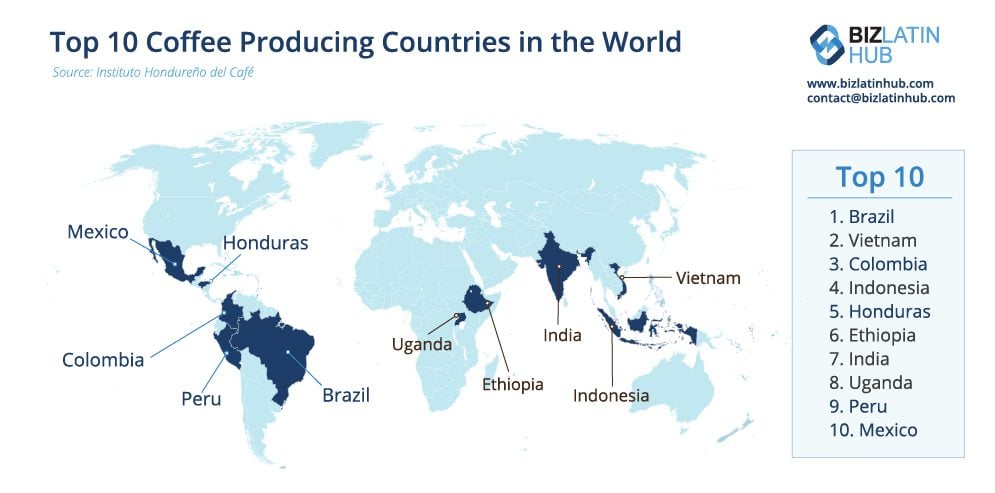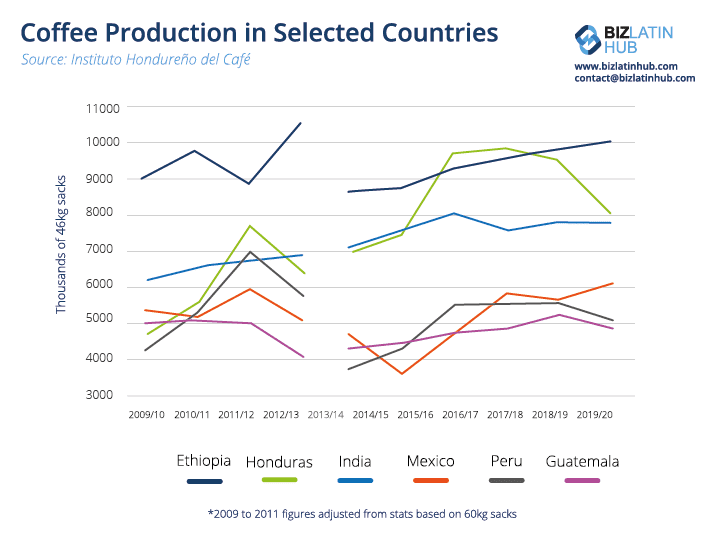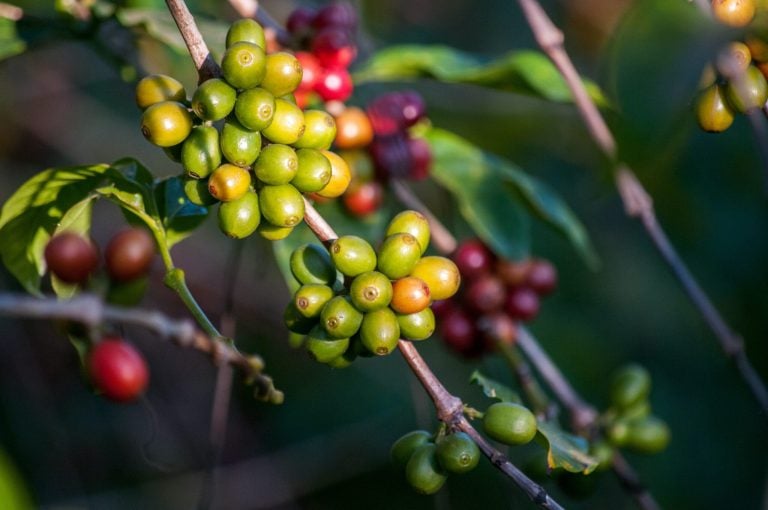Increased Honduras coffee harvests over recent years have led the Central American nation to challenge the established ‘big five’ of coffee producing countries, made up of Brazil, Vietnam, Colombia, Indonesia, and Ethiopia.

Brazil stands head and shoulders ahead of all other coffee producing countries, generating an average of more than 73 million sacks of coffee per year between 2015 and 2020 compared to roughly 40 million sacks produced annually by second-placed Vietnam, as highlighted in a new report from Instituto Hondureño del Café (IHCafe).
According to that report, while Colombia and Indonesia are firmly established as the third- and fourth-largest coffee producing countries, generating an average of 18 million and 14.5 million sacks respectively each year during the same period, Honduras coffee yields have seen it push increasingly closer to overtaking fifth-placed Ethiopia.
SEE ALSO: Register a Business in Honduras: a 6-Step Guide
Between 2015 and 2020, while Ethiopia produced an average of 9.5 million sacks of coffee per year, Honduras produced an average of 8.95 million per year, and even exceeded Ethiopian production in the 2016/17 and 2017/18 harvests.
That points to considerable growth in the Honduras coffee economy, with the country now firmly established as the leader among coffee producing countries in North and Central America, having had production comparable to both Mexico and Guatemala a decade ago. Honduran coffee plantations tend to be concentrated in the western part of the country, close to its borders with El Salvador and Guatemala.
For the purposes of this article, all pre-2014 values published by IHCafe have been adjusted to reflect the fact that counting is currently based on 46 kilogram sacks of coffee, having previously been based on 60 kilogram sacks. If you are looking for support with your market entry or back-office operations in Latin America and the Caribbean, contact us today.
‘Big 5’ coffee producing countries challenged amid rising consumption
While the top four coffee producing countries are firmly established, Honduras has shown signs of challenging Ethiopia’s place among the ‘big five’ over recent years, while India has also been home to rising production.
That comes amid rising consumption of coffee around the world, which exceeded 100 million bags per year for the first time in 1996/7, according to figures based on 60 kg sacks published by the International Coffee Organization (ICO).

Consumption subsequently exceeded 150 million sacks for the first time in 2014/15, and hit an all-time record in excess of 168 million sacks in 2018/19. While 2019/20 saw the first decline in consumption in a decade, it still sat at more than 164 million sacks, and is expected to bounce back to growth again in the current period.
Notably, excluding the decline years of 2008/09 and 2019/20, consumption rates have been strong and growing since the 1990s, a decade during which consumption grew at roughly 2% per year. According to the ICO, that jumped to 2.4% per year between 2000 and 2005, while the record set in 2019 followed an annual increase of 2.7%.
It is in this context that rising production in Honduras coffee can be understood, with a growing international market for a product which is crucial to the Central American country’s large agricultural sector. That has seen it become increasingly significant among coffee producing countries.
Honduras coffee a cornerstone of the agricultural economy

El Salvador and Guatemala are arguably more famous for being coffee producing countries, given the historic importance of the crop to their economies and Honduras’ association with fruit production.
However, today Honduras is by far the largest producer and exporter of coffee in North and Central America, and the crop is seen as being key to reviving the country’s export economy in the face of the turmoil of the global pandemic.
That is in part because agricultural goods are so important to the export economy, given that the agricultural sector generates more than 12% of gross domestic product (GDP) – one of the highest percentages seen in Latin America and the Caribbean.
As such, agricultural goods represent almost 60% of total Honduran exports by value, with coffee, tobacco, palm oil, and shrimp being of particular significance.
Currently, coffee producing countries are seeing something of a boom, with prices more than doubling over the past year. Honduras has seen a concomitant rise in the value of exports, which increased 350% in October and November 2021 compared to the same period the previous year.
That has drawn experts to predict an increase in the amount of land being used to produce Honduran coffee, promising to drive exports even higher and potentially seeing the country establish itself among the top five global producers at a time when Honduras offers considerable attraction to foreign investors.
Biz Latin Hub can assist you doing business in coffee producing countries like Honduras
At Biz Latin Hub, we provide integrated back-office services to investors and corporations entering and doing business in Latin America and the Caribbean, including a few top coffee producing countries.
Our comprehensive portfolio of services includes accounting & taxation, company formation, due diligence, hiring & PEO, and corporate legal services, meaning we can provide a tailored package of services to suit every need.
With teams in place in 16 markets around the region, we are also ideal partners for multi-jurisdiction market entry and operational support.
Whether you are interested in investing in Honduras coffee, other opportunities in this Central American market, or possibilities available in other coffee producing countries, contact us today to find out more about how we can help you reach your commercial goals.
Or read about our team and expert authors.





